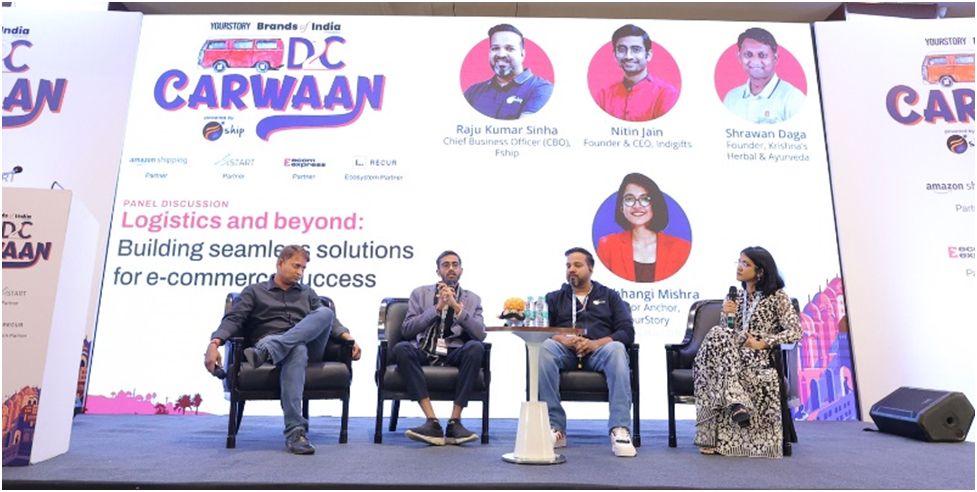

An integral player operates tirelessly in the background of India’s rapidly growing ecommerce sector: the logistics provider. In a wallet PLATFORM' target='_blank' title='digital-Latest Updates, Photos, Videos are a click away, CLICK NOW'>digital commerce landscape where customers expect a wider array of products at lower prices and swift delivery, the remarkable growth of direct-to-consumer (D2C) brands is prompting logistics companies to extend their services to smaller towns. Logistics and technology ecosystems have emerged as vital enablers, providing seamless and dependable delivery experiences that form the foundation of this thriving sector.
To showcase how logistics solutions are transforming the ecommerce landscape, a panel discussion took place at the jaipur edition of D2C Carwaan, an event designed to onboard brands that embody the spirit of india and assist them in forming connections with the right stakeholders, including investors, enablers, and mentors.
The panellists - Shrawan Daga, Founder of Krishna's Herbal & Ayurveda; Nitin Jain, Founder and CEO of Indigifts; and Raju Kumar Sinha, Chief business Officer at Fship - shared their opinions and insights on the subject 'Logistics and beyond: Building seamless solutions for ecommerce success.'
Accelerating delivery speeds was a key discussion point. Daga noted that one of the primary challenges for D2C brands in logistics is achieving rapid delivery. In the past year, ecommerce platforms have made considerable advancements in improving delivery speed by offering same-day and next-day services to meet consumer expectations.
"The quicker you deliver your products, the lower your Return to Origin (RTO) rates—the percentage of goods returned to the seller—and the higher your profits," he explained, adding that his company ships orders from 11 states. Effectively managing customer returns is a crucial aspect of ecommerce logistics for D2C brands.
Each D2C brand encounters its unique challenges. "Prepaid orders only begin to flow in if you have a loyal customer base. One significant factor contributing to the high RTOs for some brands is cash on delivery (COD), which tends to encourage impulse purchases," Sinha remarked. He proposed solutions such as prepaid shipping and AI-driven address verification, suggesting that it's beneficial to duplicate inventories at various warehouses or closer to customers to guarantee quick delivery and effective logistics management.
Focusing on tailored solutions, Jain mentioned that Indigifts does not adapt to customer demands since they are often not loyal. "We have explicitly defined our target price point and therefore avoid COD to protect our profit margins. Without the right logistics partner, building a distribution network is nearly impossible," he emphasized.
On the topic of avoiding COD, Jain shared his three-tiered business funnel - customer, consumer, advocate - a design framework he utilizes on his website. "The challenge is to transition customers into consumers, and to achieve this, it’s crucial to curate product selections that align with what you aim to sell," he explained.
The advent of rapid, complimentary shipping has reshaped consumer expectations and influenced retailers and brands across the board. All panellists acknowledged that free shipping has become intertwined with customer behavior and is now a prevailing mindset. They also discussed the implications of free shipping on profit margins, recommending tactics like surface shipping and zone-specific logistics.
But how can brands enhance their profit margins and minimize logistics expenses while still providing free shipping for their customers? "With india now having the second-largest road network in the world, a COD-focused business that prioritizes speed should opt for surface shipping, which is about 35-40% more economical than air shipping," Sinha asserted, adding that brands need to exercise caution when choosing the right courier partner.
While numerous brands provide free shipping or free shipping above a certain order value, to align with current consumer demands, these companies ultimately need to absorb these shipping expenses and incorporate them into their business models. In guiding entrepreneurs on how to tackle logistics challenges, the speakers emphasized the importance of concentrating on regional deliveries to lower shipping expenses and return-to-origin rates. Companies should partner with dependable third-party logistics providers who possess knowledgeable staff in ecommerce and extensive network reach, or specialized ecommerce courier aggregators that offer access to all major couriers through a single platform.




 click and follow Indiaherald WhatsApp channel
click and follow Indiaherald WhatsApp channel